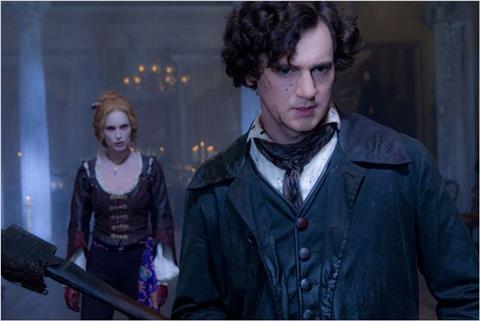Dir: Timur Bekmambetov. US. 2012. 105mins

Historical accuracy and narrative subtlety be damned, Abraham Lincoln: Vampire Hunter is an agreeably ludicrous action-horror film that starts off over-the-top and simply proceeds from there. Re-envisioning America’s 16th president as an axe-wielding killing machine consumed with getting vengeance on the vampire that murdered his dear mother, this Fox offering will easily irritate those not willing to get on Wanted director Timur Bekmambetov’s gonzo wavelength. Nonetheless, the film’s confident commitment to its utter escapist bent proves to be oddly charming.
Abraham Lincoln: Vampire Hunter is well-made junk food — something you wouldn’t want to subsist on, but perfectly acceptable from time to time.
Opening June 22, Abraham Lincoln: Vampire Hunter is an unusual summer offering in that it features neither big stars nor source material that’s widely known throughout the culture. (The film is based on Seth Grahame-Smith’s 2010 novel, which did appear on The New York Times’ Best Sellers list for fiction.) Still, the juxtaposition of history and horror in the title might intrigue audiences, although it’s an open question how much overseas interest there will be in a rewrite of Lincoln’s story.
Told in flashback, Abraham Lincoln reveals how a young Lincoln (Benjamin Walker) began cultivating a secret life, unknown by historians, as a vampire killer tutored by mentor and friend Henry Sturges (Dominic Cooper). Vowing to kill a bloodsucker named Adam (Rufus Sewell) who killed his mother in front of him, Lincoln grows up to become a lawyer and then eventually president. All the while, though, he holds a grudge against Adam, who is hoping that the forthcoming Civil War will help pave the way for vampires to take over America.
Adapted by Grahame-Smith, who also wrote the screenplay for this summer’s Dark Shadows, Abraham Lincoln is very much like Bekmambetov’s Wanted and Night Watch/Day Watch films in that it’s endlessly visual stylish but more than a little hollow dramatically. Nonetheless, Abraham Lincoln is one of those rare cases when the excesses and artificiality build so gloriously that the film’s clear flaws start to seem like little more than adorable quirks.
Indicative of the movie’s ambitions, one of its finest moments involves a giddily preposterous chase sequence between Lincoln and one of his foes in the midst of a dangerous horse stampede, which requires the two characters to leap from horse to horse to pursue one another. It’s a sequence that could only happen thanks to the wonders of CGI — Bekmambetov doesn’t even bother trying to make the action conform to the laws of science — and yet the sheer audacity of the set piece’s absurdity is in keeping with the film’s earnestly overdramatic, hyper-violent style.
A movie this adrenalised needs some sort of emotional anchor, and Walker provides that with his understated turn as Lincoln. Playing the president first as a young man and then as the weary 50-something leader of the Union during the Civil War, Walker acquits himself nicely with both the old-age makeup and Grahame-Smith’s occasionally ham-fisted dialogue.
Abraham Lincoln never quite reconciles its bloody, glib action sequences with its more sombre moments of character drama — Bekmambetov can stage explosive slow-motion excitement, but he can’t make people talking interesting — but Walker’s charismatic presence serves as a constant in this uneven film.
Understandably, there will be those who object to the film’s blatant desecration of one of the most critical and painful chapters in American history. (Transforming real-life abolitionist Harriet Tubman into a mere supporting player in Lincoln’s vampire battle is but one of the film’s cheeky dismissals of the real scourge of slavery.) But to be fair, from its first frames Abraham Lincoln exists in an exaggerated, wholly invented past that never pretends to be a faithful retelling. Expecting accuracy or historical reverence from this slick pop entertainment is a sure path to easy aggravation.
For a movie filled with such histrionic action scenes and questionable factual content, Abraham Lincoln benefits greatly from some ace supporting performances. Anthony Mackie has been far better in everything from The Hurt Locker to Night Catches Us, but here as Lincoln’s oldest friend, he exudes a cocky charm and casual gravitas that help add soulfulness to Bekmambetov’s restless visual flow. Likewise, Dominic Cooper imbues the proceedings with a suave self-assurance as Lincoln’s smug mentor, and Rufus Sewell is all smarmy menace as our hero’s nemesis. (Playing Lincoln’s wife Mary Todd, Mary Elizabeth Winstead unfortunately is saddled with the script’s dullest bits of business.) All told, Abraham Lincoln: Vampire Hunter is well-made junk food — something you wouldn’t want to subsist on, but perfectly acceptable from time to time.
Production company: Dune Entertainment, Burton/Bekmambetov/Lemley Productions
Domestic distribution: Twentieth Century Fox, www.foxmovies.com
Producers: Tim Burton, Timur Bekmambetov, Jim Lemley
Executive producers: Michele Wolkoff, John J. Kelly, Simon Kinberg, Seth Grahame-Smith
Screenplay: Seth Grahame-Smith, based on the novel by Seth Grahame-Smith
Cinematography: Caleb Deschanel
Production design: François Audouy
Editor: William Hoy
Music: Henry Jackman
Website: www.facebook.com/vampirehunter
Main cast: Benjamin Walker, Dominic Cooper, Anthony Mackie, Mary Elizabeth Winstead, Rufus Sewell, Marton Csokas, Jimmi Simpson, Joseph Mawle, Robin McLeavy





















